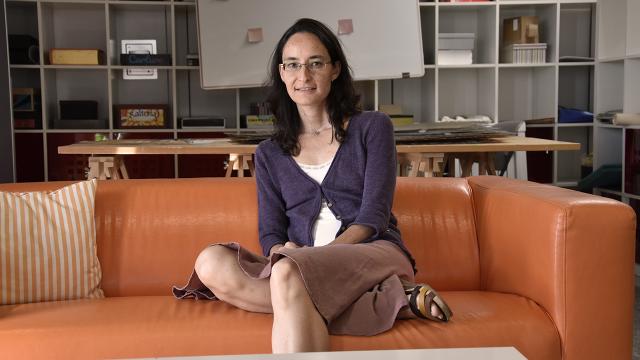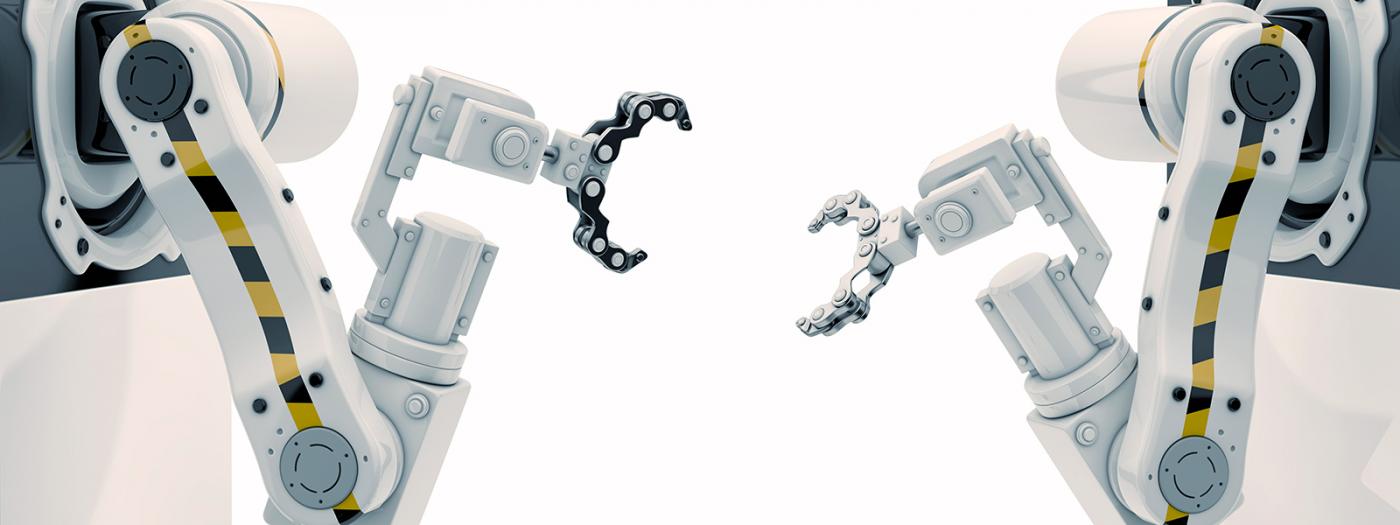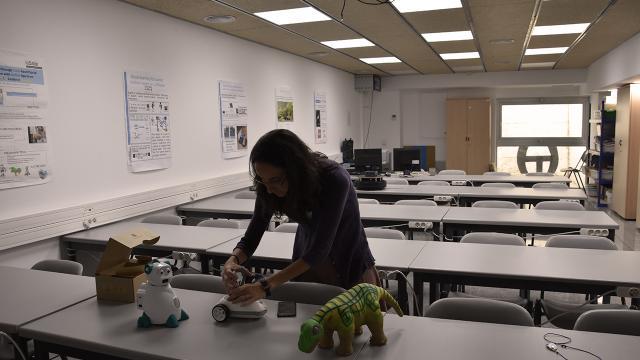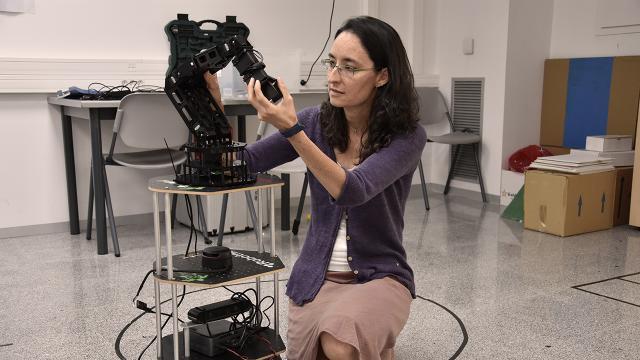Raquel, tell us a little about your professional career up to now and how you have joined La Salle-URL
I did my PhD at the Artificial Intelligence Research Institute (IIIA-CSIC) between 2003 and 2008, where I focused on the application of AI methods for robots performing collaborative tasks. During that time I also did three stays at Carnegie Mellon in Pittsburgh, a world-renowned university in the field of robotics. After completing my thesis I won a Marie-Curie scholarship from the European Union to continue my research career in Toulouse, at the Laboratoire d'Analyse et d'Architecture des Systèmes (LAAS-CNRS). It is there where my research on man-robot interaction issues begins, focusing on the transfer of cognitive models developed in the area of robot psychology to improve man-robot interaction.
Two years later, I moved to London to work on the European project ALIZ-E at the Personal Robotics laboratory of Imperial College London. This time the project focused on the development of robots in the health and education field, where a humanoid robot, the Nao, had to interact with children during a sequence of sessions to acquire healthy eating habits and physical activities. After 10 years in the research world, I decided to try the industrial world, and I worked in Cambridge. Consultants, a consulting firm dedicated to the development of innovative products. There I worked with the user-centered design team, conducting exploitation studies to identify end-user needs and issues to guide the design of new products.
Finally, in September 2017 I joined La Salle, with many desires to return at the world of research and teaching, and to continue working on the development and application of social robotics in the fields of education and health mainly.
In terms of training and research, what differences do you see between the different places you have been?
I was fortunate enough to work in places where robotics has long been a major challenge and therefore a lot of resources have always been allocated to work with very advanced robots. This is clearly very motivating for students and facilitates the development of relevant research inputs.
The most significant difference would probably be between the United States and Europe. In the United States, the pace is very intense, and the students are very dedicated to getting ahead. In Europe, this is not the case. I'm not saying that they're not interested or that they're not good, but the weather is a little more relaxed. The demand is different, we try to help the students as much as possible, and perhaps the consequences are that the students do not feel the need to give their all, since they are counting on the fact that in the end they will be helped a little. I have seen thesis defenses where the same thesis advisor questions the candidate more than the rest of the panel!
During my time at Cambridge, I was also surprised by the high level of achievement of the high school students. It is quite common for students, before entering university, to spend a year in a company in order to have a first work experience and make sure that the degree they choose is the one they want to do later on. During this year they are working on company projects, learning a lot from everyday life, but also developing and making important contributions... It is not about doing tedious work or work that nobody wants to do! On the contrary, they are given opportunities to be creative and innovative.

Raquel Ros at La Salle-URL
You are specialized in the artificial intelligence applied to robotics, explain us a little about the current situation in this field.
This is a very important moment, when we are moving from having robots in laboratories that only researchers have access to, to robots that are within the reach of "street" people. A bit like computers, when they started to be sold for personal use and not just in restricted sectors. It's true that the most advanced robots are still lab robots, but there are a lot of less sophisticated, but with a lot of potential, robots that are now much easier to acquire, which has both positive and negative implications, like everything else!
As positive, mainly, I believe that this opens up an important space for robotics in people's daily lives. To be able to really reach the people who need it and "how" they need it. That is to say, satisfying real needs and not fictitious scenarios with which we have traditionally worked until recently. The implication of this is that research can be much more applied. Now we can really talk about developing robots that benefit society directly, and not in the long term, or indirectly. The application is real, the challenges are real, and the research needs to be done to meet these needs.
Another advantage is that little by little, society can become aware of what robots are, how they can be used and what benefits they can bring. This is very important because the myths that have been created with science fiction, where there are exterminating robots that will kill society, must be broken! Having robots within the reach of the population will make people lose this fear, which is usually the result of little knowledge of robotics so far.
But as in everything else, there are also negative, or rather risky, consequences. I think the danger is that many people who don't have any theoretical background or minimal knowledge in robotics will have access to this technology and will try to "sell" ideas or products under this name, when in fact they may have little robotics. The risk is that it will be used more as a marketing tool than as a product where the need to be a robot is justified. The problem will be that consumers will be very confused, that they will end up having a wrong idea of what a robot is and therefore, it can negatively affect the advances in robotics.
Returning to the similarity with the development of computers, PCs (personal computers) began to be marketed in the late 1970s and early 1980s. For a long time only very specific tasks could be done and people did not have the knowledge to go further. But it forced everyone, developers and users, to develop and learn applications closer to people's needs. It was then a great impulse to bring this technology closer to people, and on the other hand, to people to adapt to this new product using it to meet every day needs. I think we are now at this point with robotics and I hope that at some point it will be as useful and affordable for everyone as computers, for example.
Robotics applied to industry and its influence on jobs is very often discussed. Here at La Salle there is a lot of work done on the educational level, what can a robot do to help in education?
A lot! It is a tool to learn and discover knowledge in an encouraging and fun way. I believe that there are two main aspects, and these are the ones that La Salle is now working on precisely:
On the one hand, STEAM (Science, Technology, Engineering, Art and Maths learning method) can be done through the creation of a robot. The robot is a tangible element with great motivating potential that improves immersion in the activity, enhancing learning in problem solving, computational and engineering thinking, and learning by mistake, as well as encouraging creativity and the development of social and motor skills. The acquisition and retention of knowledge is not only based on theory or memorization, on the contrary, they understand what they are learning and why.
On the other hand, the robot is also proposed as a support tool in learning, where the robot can play a role of companion or assistant-tutor, which helps to consolidate knowledge acquired by other means. In this case, the robot is one more entity that accompanies the student when he or she is carrying out an activity, such as, for example, repeating learned concepts, reviewing acquired knowledge, clarifying doubts (to a certain extent!), and above all, accompanying the student in a personalized and motivating way. Thus, the knowledge retention activities are fun, and as in the previous point, the student ends up consolidating the knowledge in a fun way and without realizing it.
Specifically, what do you do at La Salle? What kind of robotics do students do?
La Salle students have so far been working on robotics in the construction of robots from scratch to perform a particular task, prioritizing the development of social robots. So far this has worked quite well, as robotics has not been available to everyone. But this is changing and there are already quite a few more reasonably priced commercial robots available for purchase. This opens the door to being able to focus not so much on the development of the robot's hardware part as up to now, but on the development of robot behaviors. Building robots from scratch no longer makes so much sense, unless you want to do it for mechanical and electronic knowledge. But if the objective is the development of social robots applied to the benefit of society, studies must be focused on this higher level area, using market robots to make significant advances. This does not, of course, mean that a commercial robot does not have to have components added to it as required. And here you have to touch the hardware and therefore, the knowledge and experience in these areas is also relevant.
Can you highlight any outstanding projects you have worked on?
La Salle has been working in the world of social robotics for some years now. The most outstanding projects were those of the Fundació Marató de Tv3, where therapeutic activities were carried out through the assembly of LEGO robots to develop the cognitive functions of minor patients who had suffered from acquired brain disorders. The other significant project is the PATRICIA project, which focuses on the use of pet robots, mainly PLEO, in short-term robot-patient interaction in hospitalized children in order to validate whether their use is beneficial in minimizing the level of distress. In both projects the Hospital Sant Joan de Déu was part of the consortium, and it is obviously where the studies with patients were carried out.
Where do we go from here in the future?
Well, I hope it made the world a better place! It sounds very utopian, but I believe and hope that robots can be very beneficial in our society. A society that is getting bigger and bigger, that is getting busier and busier and needs a break, and therefore, help is always welcome. I see robots as tools that can support us in our daily lives, not replace us in tasks or activities that we like and want to do. Tools that allow us to enjoy those things that for many reasons we cannot now, but want.
However, we are still at a very early stage in the development of robots that can actually do many different things in a world as complex as ours. Now is the time to develop robots in specific activities, but that already have a direct impact on society, that are really end users who work/use the robots. Once this is achieved, we will be able to think of more flexible robots that are capable of adapting to more and more tasks/activities, even if one day we will manage to develop a generic robot that can take care of any task as people would do it.


